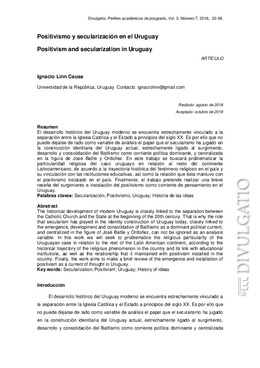Positivismo y secularización en el Uruguay
Positivism and secularization in Uruguay
Abstract
El desarrollo histórico del Uruguay moderno se encuentra estrechamente vinculado a la separación entre la Iglesia Católica y el Estado a principios del siglo XX. Es por ello que no puede dejarse de lado como variable de análisis el papel que el secularismo ha jugado en la construcción identitaria del Uruguay actual, estrechamente ligado al surgimiento, desarrollo y consolidación del Batllismo como corriente política dominante, y centralizada en la figura de José Batlle y Ordoñez. En este trabajo se buscará problematizar la particularidad religiosa del caso uruguayo en relación al resto del continente Latinoamericano, de acuerdo a la trayectoria histórica del fenómeno religioso en el país y su vinculación con las instituciones educativas, así como la relación que ésta mantuvo con el positivismo instalado en el país. Finalmente, el trabajo pretende realizar una breve reseña del surgimiento e instalación del positivismo como corriente de pensamiento en el Uruguay. The historical development of modern Uruguay is closely linked to the separation between the Catholic Church and the State at the beginning of the 20th century. That is why the role that secularism has played in the identity construction of Uruguay today, closely linked to the emergence, development and consolidation of Batllismo as a dominant political current, and centralized in the figure of José Batlle y Ordoñez, can not be ignored as an analysis variable. In this work we will seek to problematize the religious particularity of the Uruguayan case in relation to the rest of the Latin American continent, according to the historical trajectory of the religious phenomenon in the country and its link with educational institutions, as well as the relationship that it maintained with positivism installed in the country. Finally, the work aims to make a brief review of the emergence and installation of positivism as a current of thought in Uruguay.

